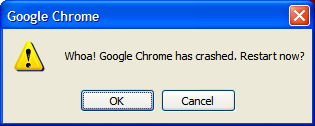The Internet is absolutely all over itself lately about Google’s new browser, Chrome. It’s only a beta, but when you think about it, what product of Google’s is not beta? When I heard the news my first reaction was one of distrust. After all, nobody really knows what data Google is collecting about their users. But I decided to give the browser a try anyway after reading their comic book, which describes the technical attributes of their new-from-the-ground-up browser design.
Wow is Chrome fast! Page rendering is absolutely blazing! Compared to any other browser I’ve ever used, Chrome is the absolute fastest by far. That alone should compel you to give it a try.
Because of the way Chrome spawns individual processes it clearly uses more system resources than other browsers. On today’s modern systems that shouldn’t be a problem and the benefits of enhanced resource management are clear. [Added later on the same day: It still crashes, though, despite process isolation. See the EvilFingers site for an explanation and demo of the flaw in v0.2.149.27. https://www.evilfingers.com/advisory/Google_Chrome_Browser_0.2.149.27_in_chrome_dll.php

As usual, the masses are very quick to point out flaws. The first thing that I heard of was Chrome’s vulnerability to drive-by security problems. Downloads occur in the background, and it could be easy to accidentally launch an executable. It shouldn’t be a problem if you’re careful.
There is a phrase that’s been going around lately to describe privacy enhanced browsing, the so-called ‘porn mode’. I object! There are many, many reasons why one might wish to take advantage of enhanced privacy while they browse. Why not use a less antagonistic label, like ‘privacy-enhanced’ or ‘privacy-mode’? (You’re welcome. I’m omitting a rant about how language kills.)
Cookies and pop-ups seem to be handled more intelligently as well, although those that pay for pop-up ads may not agree. Pop-ups are minimally displayed in and the user needs to choose to see it. This can trigger a billable event without the (benefit?) of the user ever seeing the pop-up. As a user I’m pleased with this behavior. As a business owner with Web properties I’m also pleased, because I’ve long believed that using things like pop-ups and cookies to track my customers is poor behavior on my part.
There’s been quite a bit of speculation about which direction Google may take Chrome. Some are even saying that this could be the beginning of the end for desktop operating systems altogether. Can you imagine this thing sitting on a bare metal hypervisor, without the overhead of an operating system? Exciting times are ahead.
